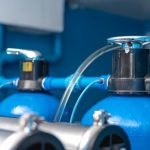Maintenance Tips for Commercial Water Purification Systems

Why Maintenance is Important
Regular maintenance of a commercial water purification system is vital for several reasons. Firstly, it ensures that the system operates at its peak performance, delivering clean and safe water consistently. Skipping or neglecting maintenance can lead to gradual deterioration in the system’s efficiency and effectiveness. Secondly, regular maintenance helps prevent unexpected breakdowns and reduces the risk of costly repairs. By identifying and addressing potential issues early on, you can avoid major disruptions to your operations and save on repair expenses. Lastly, maintaining your water purification system is essential for compliance with regulatory requirements. Failure to meet water quality standards can result in legal violations and reputational damages.
Required Maintenance for Commercial Water Purification Systems
1. Regular Filter Replacement
Filters are a crucial component of any water purification system, as they trap and remove contaminants from the water. Over time, filters become clogged and lose their effectiveness, reducing the quality of the water they produce. It is important to follow the manufacturer’s guidelines and replace filters at the recommended intervals. Regular filter replacement ensures optimal filtration performance and prevents the build-up of harmful pollutants.
2. Cleaning and Sanitization
Commercial water purification systems, especially those utilizing membranes, require regular cleaning and sanitization. Over time, organic and inorganic matter can accumulate on the membranes, reducing their efficiency. Cleaning the membranes using appropriate solutions and techniques is important to remove any residues and maintain their performance. Additionally, it is crucial to sanitize the system to prevent bacterial or microbial growth, which can lead to contamination of the water.
3. Check for Leaks and Damage
Regularly inspecting the water purification system for leaks or damage is an essential part of maintenance. Damaged pipes, valves, or fittings can lead to water loss, reduce efficiency, and compromise water quality. Look for signs of moisture or leaks around the system and promptly repair any identified issues. By addressing leaks and damage in a timely manner, you can prevent further damage and ensure the system operates optimally.
4. Monitor Water Quality
Monitoring the quality of the water produced by the purification system is crucial for ensuring its effectiveness. Regularly test and analyze the water for various parameters such as pH, turbidity, dissolved solids, and microbiological contaminants. Monitoring water quality allows you to identify any deviations or fluctuations and take appropriate corrective actions. It is also essential for demonstrating compliance with regulatory requirements and maintaining public health and safety.
Consequences of Neglecting Maintenance
Neglecting maintenance of a commercial water purification system can have severe consequences. Firstly, the water quality may deteriorate over time, leading to potential health risks for consumers. Impurities, chemicals, and microbial contaminants may go unnoticed, compromising the safety of the water supply. Secondly, a poorly maintained system may consume more energy, resulting in higher utility costs. Inefficient filtration, clogged filters, or damaged components can increase energy consumption and put a strain on your budget. Lastly, neglecting maintenance can lead to unexpected breakdowns, system failures, and costly repairs or replacements. This can disrupt operations, cause downtime, and impact the reputation of your business.
Summary
Regular maintenance of a commercial water purification system is essential for optimal performance, water quality, and compliance. By following these maintenance tips, such as regular filter replacement, cleaning and sanitization, checking for leaks and damage, and monitoring water quality, you can ensure that your system operates at its best. Remember that neglecting maintenance can result in degraded water quality, higher costs, and potential system failures. Don’t overlook the importance of maintenance and prioritize the health and safety of your water supply.
Need Industrial & Commercial Water Purification in Cincinnati, OH?
Since 1999, Ultra Pure Water Technologies, LLC has been one of the best water purification business throughout the state of Ohio and beyond. Ultra Pure Water Technologies, LLC specializes in the sale, design, installation, maintenance, and service of commercial, industrial, and medical water pre-treatment and filtration systems. We offer water softeners, water filter replacements, carbon filtration, reverse osmosis, and deionization. Some of the products we have available include USP type-I, II, and II water and DI exchange tanks. We are a member of the Water Quality Association. Call in today for a free estimate!
Categorised in: Commercial Water Purification, Commercial Water System
This post was written by admin